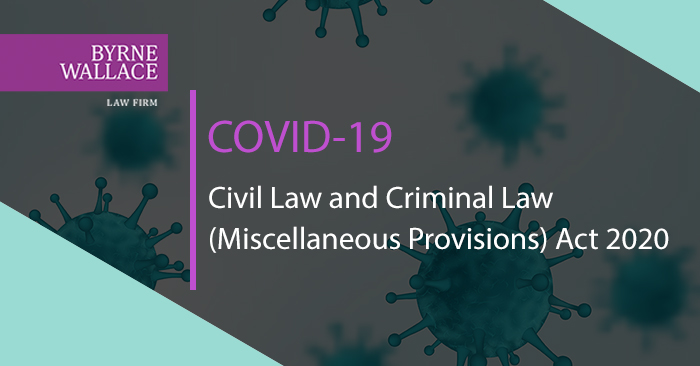COVID-19 - Civil Law and Criminal Law (Miscellaneous Provisions) Act 2020
Tuesday, 11 August 2020
Prompted by the challenges created by the COVID-19 pandemic to
the Irish courts and legal system, the Irish government introduced the Civil
Law and Criminal Law (Miscellaneous Provisions) Act 2020 (the "Act"). The Act is designed to meet
immediate challenges caused by the pandemic and includes the authorisation of
additional capacity in the coroner system to assist with reducing the backlog
caused by COVID-19 related deaths; the use of electronic means for filing and
issuing of court documents in civil proceedings by practitioners and the courts
and court offices and the expansion of live video link and remote hearings in
civil and criminal proceedings to address the requirements of social distancing.
However, certain features of the Act will have a continuing impact beyond the
current pandemic and we focus on two of these features below.
Statement of truth to
replace traditional swearings
Under section 21 of the Act, so-called “statements of truth” can
be used in civil proceedings, in accordance with the rules of court, in place
of affidavits and statutory declarations. This replaces the traditional approach
of swearing these documents on a religious oath and in the physical presence of
a Commissioner for Oaths or a practicing solicitor. This change has been
advocated by the Law Reform Commission for some time and already operates in
England, though its implementation in Ireland has been accelerated by COVID-19
and the new social distancing norms.
A statement of truth is a simple declaration that confirms the
facts stated in the document are true. It can be in electronic form, it must
state that the person making the statement has an honest belief that the facts
as stated are true and it must be signed by the person making the statement
electronically or otherwise as permitted by the rules of court. A failure to
include a statement of truth could lead to the document and the evidence it
contains being disregarded. False statements of truth can lead to proceedings
for contempt of court, and as set out specifically in section 21 of the Act, it
is also a criminal offence to make a statement of truth without an honest
belief as to the truth of that statement. The possible penalties for committing
this offence are a €5,000 fine and/or imprisonment up to 12 months (on summary
conviction) or a fine up to €250,000 and/or imprisonment up to 5 years (on conviction
on indictment).
Admissibility of ‘business
records’ in civil proceedings – amendment of the hearsay rule
Chapter 3 of the Act introduces a significant change to the law
of evidence in civil proceedings and creates a statutory exception to the
hearsay rule. Section 13 provides that any record in document form compiled in
the ordinary course of business is presumed to be admissible as evidence of the
truth of the facts asserted in such a document.
A key principle of the law of evidence is that evidence should,
in general, be capable of being tested in court, especially by
cross-examination. Ordinarily, where a document is produced before a court, an
individual is required to come before the court and give evidence as to the
provenance and content of that document. Section 13 creates a presumption that
the information contained in the “business records” is proof of the facts
contained in those records without the relevant individual giving evidence or
being cross-examined. The presumption may be challenged, but this shifts the onus
to the other party to establish that the evidence contained in those records is
untrue or incorrect.
Section 14 of the Act details the requirements for the admissibility
of business records. Section 15 deals with how notice and delivery of the
business record must be provided to the other parties. This section also sets
out how an objection to such a business record may be raised. Section 16
provides safeguards on the operation of the procedure and provides that
business records shall not be admitted into evidence where the Court is of the
opinion that to do so would not be in the “interests of justice”. In making
this assessment the Court must consider “all circumstances” and in particular,
whether or not it is a reasonable inference that the information is reliable and
the document authentic. The court must also consider whether there is any risk
that the admission or exclusion will result in unfairness to any other party in
the civil proceedings.
Section 17 of the Act deals with the admission of information
where it goes to or questions the credibility of a witness. Section 18 allows
for the admission of copies of business records subject to authentication as
approved by the court and section 19 provides that evidence of resolutions passed
by either House of the Oireachtas may be given by production of the official Journal
of the proceedings.
The Act became law on 6 August, with the majority of sections (including all those referenced above) being commenced by Ministerial Order as of 21 August.
For more information or general advice on what the Act might mean for you or your business, please contact, John Fitzgerald, Head of Corporate Restructuring and Insolvency and Helen Gibbons from our Litigation and Dispute Resolution team, or your usual ByrneWallace contact.
Please note that the content of this summary
does not amount to professional advice. Legal and tax advice should be sought
in respect of specific queries. The COVID-19 situation is evolving rapidly and
this update is provided on the basis of information available as at 18 August 2020.

